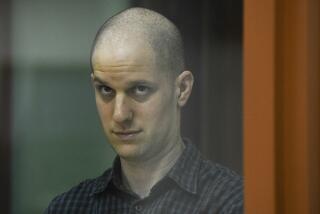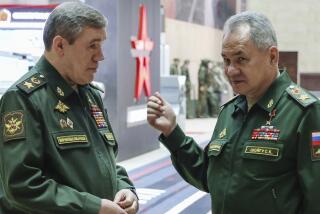Russia Seeks Extradition of Exiled Tycoon
- Share via
MOSCOW — MOSCOW -- Pushing the Kremlin’s fight with a once-powerful oligarch onto the international stage, Russian prosecutors have asked Britain to extradite self-exiled tycoon Boris A. Berezovsky to face corruption charges, authorities said Tuesday.
Berezovsky, a onetime Kremlin insider who helped make or break prime ministers and presidents, is one of President Vladimir V. Putin’s most vociferous critics.
A Moscow court issued an arrest warrant for Berezovsky and two associates last week on charges of fraud in connection with the 1994-95 theft of cars worth $13 million from Russia’s largest auto maker, Avtovaz. Berezovsky says the charges are politically motivated.
In a separate action Tuesday, Vladimir B. Rushailo, secretary of Putin’s Security Council, demanded that Georgia capture and extradite Ruslan Gelayev, a Chechen separatist leader who the Kremlin believes is in that former Soviet republic, using the wild Pankisi Gorge as a base for attacks on neighboring Russia.
Russian forces pressed forward with security sweeps in Chechnya on Tuesday, evicting residents and then blowing up two apartment buildings near a military base to prevent rebel fighters from using them to stage attacks. On Sunday, a missile fired from a launcher in a ruined five-story building on the outskirts of the Chechen capital, Grozny, brought down a Russian helicopter, killing nine soldiers.
Further pressing a tough line on the separatist republic in the wake of the recent seizure of a Moscow theater by Chechen rebels, Putin’s human rights envoy for Chechnya urged Russian rights activists Tuesday to cancel a planned conference on peace in the republic.
Holding the weekend conference would be tantamount to giving in to the demands of terrorists, said the envoy, Abdul-Khakim Sultygov.
After Putin’s rise to the presidency, Berezovsky disagreed with him on some key domestic policy issues, including the president’s tough line on Chechnya. Their break, according to Berezovsky, came when Putin complained after the August 2000 sinking of the nuclear submarine Kursk about the coverage of the disaster on ORT television, which Berezovsky controlled through a 49% ownership share.
“This feud between the Kremlin and Berezovsky has been very actively waged by both sides for a few years already,” said Andrei Piontkovsky, director of the Independent Institute for Strategic Studies in Moscow. “Today a new and very strong move was finally made by the Kremlin, which refrained from it for quite a while, apparently because both Putin and Berezovsky knew quite a lot about each other and didn’t really want to come to extremes.”
Berezovsky brought the extradition move on himself because he “has made fun of the Kremlin for two years, saying that he is not hiding and is ready to face any charges and that the Kremlin wouldn’t dare go to Interpol for him,” Piontkovsky said. “Putin’s patience finally ran out.”
Piontkovsky added that he believes the fraud charges are “solid and real” and predicted that Britain may eventually extradite Berezovsky. But the extradition process, if it moves forward, “may take about a year, and has the potential of reaching the House of Lords,” he said.
Britain’s Home Office, which would deal with the extradition request, had no comment.
Since fleeing to London, saying that he no longer felt safe in Russia, Berezovsky has offered himself as a rallying point for liberal opposition to Putin.
Among the charges Berezovsky makes is that Putin’s rise to power came about through a conspiracy orchestrated by the Federal Security Service, or FSB, the domestic successor to the Soviet-era KGB. Berezovsky has alleged that the FSB is responsible for apartment house bombings in 1999 that stoked public emotion against Chechnya. The bombings, which authorities blamed on Chechen rebels, have never been solved.
*
Sergei L. Loiko of The Times’ Moscow Bureau contributed to this report.
More to Read
Sign up for Essential California
The most important California stories and recommendations in your inbox every morning.
You may occasionally receive promotional content from the Los Angeles Times.













